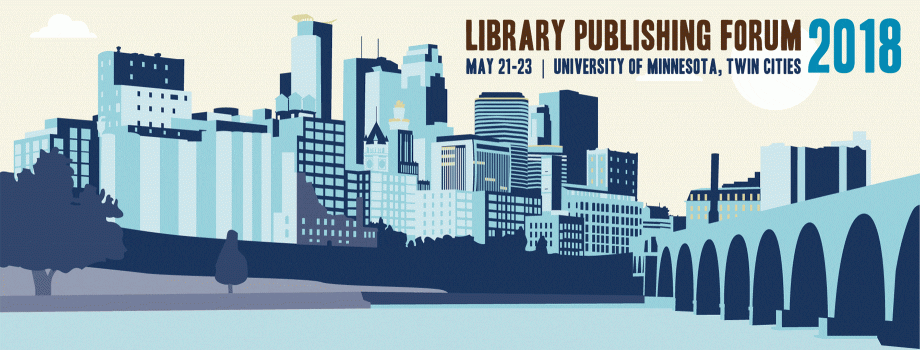April 11, 2018
Wednesday, May 23, 2:30-3:30pm
Room: Heritage Gallery
Expanding Scholarly Communication Instruction for the Next Generation of LIS Leaders: Building an Open Educational Resource to Support the Work of Scholarly Communication
Maria Bonn, University of Illinois Urbana-Champaign
Description: Librarians have become a major stakeholder in the open education movement. However, many of the courses in which we are taught our craft are still bound by traditional commercial texts. The open, collaborative nature of OER lends them a unique ability to support community-driven learning and sharing, making them an ideal venue for introducing new learners to a dynamic, aspirational field like scholarly communication. Librarians from three institutions – Kansas, Illinois, and NC State – are developing an OER for training librarians and other learners about what scholarly communication librarianship is and what it has the potential to be. This presentation describes our work developing a collaborative, community-driven, dynamic OER for introducing students and practitioners to scholarly communication.
Publishing Literacy in the For-Credit Classroom: Assessing Indiana University Journal of Undergraduate Research Student Editors
Sarah Hare, Indiana University
Description: Library publishers are in a unique position to educate undergraduate students on publishing and scholarly communication concepts. In addition to being experts in ethical publishing practices and open access funding models, library publishers often offer a publishing platform that is open to everyone affiliated with their institution, including undergraduate students.
In Fall 2017, the Scholarly Communication Librarian at Indiana University took undergraduate outreach a step further by developing a one-credit hour course for the student editorial board of the Indiana University Journal of Undergraduate Research (IUJUR). The course attempted to balance practical fundamentals—for example, learning OJS and evaluating submissions using IUJUR-specific rubrics—with larger concepts, including understanding and critiquing various peer review models, comprehending the value of open access, and grappling with ethical dilemmas.
This session will discuss how including undergraduates in library publishing outreach efforts can promote a publishing program while also furthering the library’s information literacy goals (ACRL, 2015) and the institution’s student retention ambitions (Council on Undergraduate Research, 2017). It will also describe the readings, case studies, and discussion prompts used throughout the course. While not every librarian will be able to create a for-credit course, these active-learning materials are modular and can easily be integrated into other outreach endeavors.
Finally, the session will discuss the instrument used to assess student learning. The presentation will build upon other work on assessing undergraduate publishing literacy and student confidence before and after library outreach (Weiner & Watkinson, 2014) to present formative and summative assessment strategies participants can adopt.
Beta Testing an Open Access Monograph Publishing Lab: Brainstorm Books at UCSB Library
Sherri L. Barnes, University of California, Santa Barbara; Eileen A. Fradenburg Joy, Punctum Books
Description: Sherri L. Barnes, University of California, Santa Barbara; Eileen A. Fradenburg Joy, Punctum BooksBrainstorm Books, an imprint of open access (OA) academic publisher punctum books, was launched in 2017 by University of California, Santa Barbara’s Literature and the Mind program. The unusual cohort responsible for the production of the first Brainstorm titles included: nine UCSB undergraduates; two PhD students; an English professor; a scholar-publisher; a scholarly communication librarian; and a data librarian. UCSB Library, an advocate for advancing transformative, no-fees OA publishing, interdisciplinary research, and collaboration, hosted the experimental publishing lab in its Interdisciplinary Research Collaboratory. In the two-quarter seminar / workshop-style lab, students with no prior publishing experience worked in teams to undertake the copyediting, proofreading, source verification, typesetting, and graphic design of three scholarly books written by non-UC authors. In addition to navigating and learning library systems, style manuals, and Adobe Creative Suite software, to help students better understand the business, legal, and related practical challenges of academic publishing as a “content industry,” students were also offered mini-tutorials on: (a) the history of the OA movement; (b) the history of the book; (c) the state of the art and the business of contemporary academic publishing; (d) the history of copyright and intellectual property; and (e) disputes and trends within particular information industries.
University-based open access book publishing, as a symbiotic creative collaboration between students, faculty, librarians, authors, and a publisher with shared interests yet different skills and resources, is an easily adaptable model that serves multiple purposes: (a) to provide a university-based OA publishing option for scholars who want a high-quality editorial and design experience, which places a premium on the author’s vision, and values experimentation and accessibility; (b) to present an alternative career path for PhDs interested in working in public, mission-driven scholarly communications; and (c) to provide undergraduates with an interdisciplinary, experiential, and skills-based experience.
